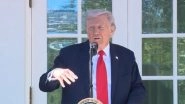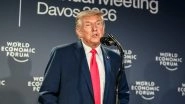New Delhi, May 31 (PTI) Overseas investors remained net sellers for the third consecutive month in May, pulling out Rs 7,366 crore from the Indian capital markets as they stayed risk averse amid the COVID-19 crisis.
As per depositories data, foreign portfolio investors (FPIs) infused a net Rs 14,569 crore into equities but pulled out a net Rs 21,935 crore from the debt segment between May 1-29.
Also Read | Google I/O 2020: Android 11 Beta Launch Event Postponed Amid Protests in the US.
This translates into a cumulative net outflow of Rs 7,366 crore in May.
Prior to this, FPIs had net withdrawn a record Rs 1.1 lakh crore in March and Rs 15,403 crore in April.
Noting that the quantum of outflow in May was lower than the previous months, Himanshu Srivastava, senior analyst manager research, Morningstar India, said "a net inflow of USD 2.3 billion was pumped into the Indian equity markets by FPIs on one single day, May 8th which changed the scenario for the month."
This could be attributed to the attractive valuation of the Indian equities after the sharp correction this year and significant depreciation of Indian rupee against USD, which provided FPIs a rather good entry point, he added.
However, he said that "since the COVID-19 pandemic has spread across various countries and regions, foreign investors have turned risk averse and have rebalanced their portfolios away from emerging markets."
Consequently, they have shifted their focus towards safer investment options or safe havens such as gold or US dollar, as against investing in fixed income securities of emerging markets like India, given the higher risk levels, he added.
"In the short term, we will have to wait at least till second quarter and third quarter to see steady inflows," said Harsh Jain, co-founder and COO at Groww.
Giving a global overview, Jain added that rising tensions between the US and China regarding the autonomy of Hong Kong and the national security law passed by Beijing could keep global investors cautious.
(The above story is verified and authored by Press Trust of India (PTI) staff. PTI, India’s premier news agency, employs more than 400 journalists and 500 stringers to cover almost every district and small town in India.. The views appearing in the above post do not reflect the opinions of LatestLY)













 Quickly
Quickly


